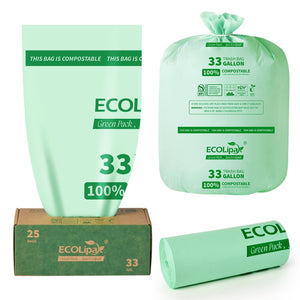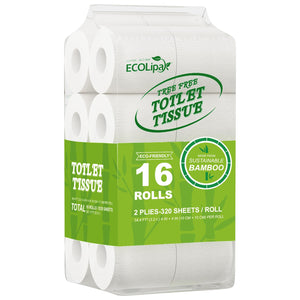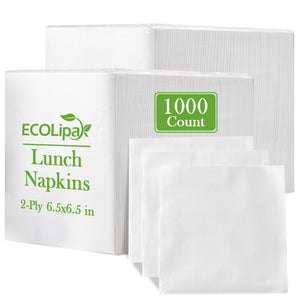You want to make your home greener and healthier. Switching to compostable trash bags is a smart move. These bags break down fast, help keep wildlife safe, and turn into soil that helps your plants grow. Ecolipak compostable garbage bags give you a strong, eco-friendly choice loved by families everywhere.
Key Takeaways
-
Choose compostable bags with certifications like ASTM D6400 to ensure they meet composting standards.
-
Use compostable bags for food scraps and organic waste to create rich compost and keep your kitchen clean.
-
Properly dispose of compostable bags by checking for the 'Home Compostable' label and shredding them before adding to your compost pile.
Choosing Compostable Trash Bags
Ecolipak Compostable Trash Bags
You want a trash bag that’s tough, green, and easy to use. Ecolipak compostable trash bags check all those boxes. These bags are made from plant-based materials and break down into healthy soil. You get durability and odor control, so your kitchen stays fresh. Many families say Ecolipak bags feel sturdy and reliable. You can trust them to hold heavy loads without tearing. Ecolipak bags come in different sizes, so you can pick what fits your home best.
Tip: Look for certifications like ASTM D6400, EN 13432, and BPI when choosing compostable bags. These show the bag meets strict composting standards.
|
Criteria |
Description |
|---|---|
|
Material Composition |
Thicker bags offer greater durability. |
|
Certifications |
Check for labels from trusted organizations. |
|
Life Cycle |
Think about how the bag breaks down after use. |
Compostable Plastic vs. Regular Plastic Bags
Compostable bags and regular plastic bags look similar, but they act very differently. Compostable bags break down in months and turn into safe compost. Regular plastic bags can last hundreds of years and pollute the earth. Compostable bags come from plants, while plastic bags use oil. When you choose compostable, you help keep waterways clean and protect wildlife.
“A study in England found that most biodegradable plastic bags did not break down significantly in soil or seawater after three years, with only compostable bags disappearing completely.”
|
Feature |
Compostable Bags |
Plastic Bags |
|---|---|---|
|
Material Composition |
Plant-based, breaks down into organic matter |
Petroleum-based, not easily biodegradable |
|
Biodegradability |
Decomposes in months to a year |
Persists for hundreds of years |
|
Environmental Impact |
Enriches soil, reduces landfill waste |
Pollutes, harms wildlife |
Home vs. Commercially Compostable Bags
Not all compostable bags work the same way. Some bags break down in your backyard compost pile. Others need the high heat and moisture of an industrial composting facility. If you want to compost at home, look for the “OK compost HOME” label. This means the bag will break down in cooler, less controlled conditions.
|
Type of Compostable Bag |
Required Conditions |
Decomposition Time |
|---|---|---|
|
Home Compostable |
Lower temperatures, variable moisture |
6 to 12 months |
|
Commercially Compostable |
High heat, controlled moisture |
Few weeks to months |
Note: Home compostable bags are perfect for families who want to compost kitchen scraps right in their backyard.
Using Compostable Garbage Bags at Home
What to Put In Compostable Bags
You want to make the most of your compostable garbage bags. Start by filling them with the right things. These bags work best when you use them for food scraps and other organic waste. Here’s what you can safely toss in:
-
Fruit and vegetable peels
-
Leftover food that is plant-based
-
Coffee grounds and tea bags
-
Eggshells
-
Yard waste like leaves and grass clippings
These items break down quickly and help create rich compost for your garden. When you use compostable plastic bags for food scraps, you keep your kitchen cleaner and make composting easier.
But not everything belongs in your compostable garbage bags. Avoid putting in:
-
Non-biodegradable materials
-
Plastic wrappers or produce stickers
-
Rubber bands and twist ties
-
Food service gloves or hairnets
These things do not break down and can ruin your compost. They might even add harmful chemicals to your soil. Always check your waste before tying up your bag.
Tip: Remove any non-compostable parts from your food scraps, like stickers on fruit or plastic ties on bread bags. This keeps your compost pure and healthy.
Preventing Leaks and Odors
Nobody likes a leaky trash bag or a smelly kitchen. Compostable garbage bags can help, but you need to use them the right way. Here are some easy steps to keep things fresh:
-
Keep your bags dry. Compostable plastic bags break down faster when wet. Line your bin with newspaper or paper towels to soak up extra moisture. Drain liquids from food before tossing them in.
-
Use smaller bags for food waste. If you have a lot of food scraps, try using a separate small bin just for them. This keeps wet waste away from other trash and makes it easier to empty often.
-
Store your bags in a cool, dry place. Heat and humidity can weaken compostable garbage bags before you even use them.
Ecolipak compostable garbage bags come with built-in odor control. They help trap smells from food scraps, so your kitchen stays fresh. The tear-resistant design means you don’t have to worry about leaks, even with heavy or wet food waste.
Note: If you notice any leaks, double-bagging or adding extra paper at the bottom can help. Always empty your bin before it gets too full.
Daily Tips for Compostable Plastic Bags
You want your compostable plastic bags to last and work well every day. Try these daily usage tips to get the best results:
-
Clean your bin after each use, especially if you throw away food scraps. This keeps odors away and stops mold from growing.
-
Fix small tears right away. You can use a bit of tape or just double-bag if needed.
-
Use cleaning products made for compostable plastic bags if you have them.
-
Store your bags in a dry, well-ventilated spot. Avoid hot or humid places, and keep them away from direct sunlight.
-
Fold bags gently to avoid creases that can turn into weak spots.
-
Keep sharp objects out of your bags. This helps prevent rips and tears.
-
Spread out the weight inside the bag. Don’t let all the food scraps pile up in one corner.
-
Rotate your bags if you have more than one box. This way, none of them sit too long and get old.
-
Before composting, remove any non-compostable parts and cut the bag into smaller pieces. This helps it break down faster.
Tip: The best storage for compostable garbage bags is a cool, dry place with good airflow. Try to keep the temperature between 50°F and 75°F. Don’t stack too many boxes on top of each other, and avoid freezing the bags.
Using compostable garbage bags the right way makes your home cleaner and greener. You protect your family’s health and help the planet at the same time. With Ecolipak’s strong, odor-fighting bags, you can handle food scraps and daily waste with confidence.
Properly Dispose of Compostable Bags
Home Composting Steps
You want to make sure you get the environmental benefits from your eco-friendly garbage bags. Home composting is a great way to do this. Here’s how you can handle the proper disposal of compostable trash bags in your backyard:
-
Check if your bag says “Home Compostable.” This label means it will break down in your home composting pile.
-
Fill your bag with the right types of waste for compostable bags, like fruit peels, veggie scraps, and coffee grounds.
-
Tear or shred the bag before adding it to your compost. Smaller pieces break down faster.
-
Add equal parts of greens (like food scraps) and browns (like dry leaves) to balance your pile.
-
Turn your compost often. This helps air get in and speeds up the process.
Compostable bags usually take 6 to 12 months to break down in home composting. You help the planet by supporting a circular economy and reducing landfill waste.
Industrial Composting Guidelines
Sometimes, you need to use an industrial composting facility for proper disposal of compostable trash bags. These places use high heat and special conditions to break down bags quickly. Always follow local rules for proper disposal. Here’s a quick look at the differences:
|
Aspect |
Home Composting |
Industrial Composting |
|---|---|---|
|
Temperature Requirements |
Lower and less steady |
High and stable |
|
Time for Decomposition |
6-12 months |
Few weeks to months |
|
Facilities |
Backyard or small bin |
Special composting centers |
|
Materials |
Plant-based waste |
Wider variety, including some plastics |
|
Environmental Impact |
Flexible, manageable at home |
Needs special collection programs |
Check your city’s website for drop-off locations and rules. Some states have strict standards for proper disposal of compostable trash bags, so always stay informed.
Common Mistakes to Avoid
You want effective waste management and the full environmental benefits from biodegradable trash bags. Watch out for these common mistakes:
-
Overpacking your compost pile slows down decomposition.
-
Too much moisture makes the pile soggy. Your compost should feel like a damp sponge.
-
Not enough moisture dries out the pile. Add water if needed.
-
Forgetting to turn your compost means less air and slower breakdown.
Tip: If your compostable bags are not breaking down, try shredding them smaller and balancing greens and browns. This helps create an environmentally friendly compost pile that works faster.
By following these steps, you ensure the proper disposal of compostable trash bags and help protect the planet for your family.
You can make your home more sustainable by following three simple steps:
-
Choose certified compostable bags for your needs.
-
Use them daily for organic waste to support a sustainable lifestyle.
-
Dispose of them in a way that fits your sustainable composting method.
Ecolipak helps you build a sustainable, healthy home.
FAQ
What makes compostable plastic different from regular plastic?
You use compostable plastic made from compostable materials. It breaks down in a home composter or commercial facility. Regular plastic does not decompose and harms the environment.
Can I put compostable plastics in my home composter?
Yes, you can add home compostable plastics to your home composter. Make sure the packaging says home compostable. These decompose with your food scraps and yard waste.
How do I know if a bag is home compostable or commercially compostable?
Look for labels. Home compostable bags break down in a home composter. Commercially compostable bags need special conditions. Always check before starting the composting process.
Tip: Home compostable plastics support your family’s health and help the planet. Choose compostable materials for a cleaner, greener home.








